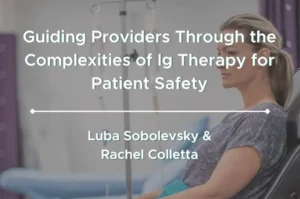Chuck DiTrapano, RPh discusses how competence, confidence, consistency, culture, creativity, and communication work together to make an infusion center successful.
There have been many improvements in the outpatient infusion market in recent years. The good news is that patients can now achieve a higher quality of life even when they are afflicted with a lifetime chronic condition through treatments utilizing periodic injections or infusions.
If you place yourself in any patient’s shoes, what would be most important to you?
Besides things like clean, comfortable surroundings, or a location close to home, the following are six characteristics I believe are important to delivery of high quality care: Competence, Confidence, Consistency, Culture, Creativity, and Communication.
Competence
Being competent in your job means “having sufficient knowledge, judgment, skill, or strength” for the duties being performed. Having competence in every aspect of your job is ideal, but is often challenging, if not impossible.
How does this translate to the administration of infusion or injectable drugs?
A clinician who knows how to prepare and/or administer and treat a patient with most drugs offered in the practice setting could be defined as competent.
However, expecting a competent clinician to know every single preparation/administration step for every single drug is infeasible. Medication information and guidelines are constantly being updated, just as new drugs are being released.

Ideally that resource should offer the following features:
- Easy to access
- Current
- Easy to navigate
- Concise (containing only the information the clinician needs)
- Trusted (by the clinician)
Practiced clinicians that would otherwise meet the standards for competency are not necessarily guaranteed the title. Though they may have sufficient knowledge and skill, their choices keep them from being adept providers.
We have all heard the manifestation of these choices: “I’ve always done it that way,” or “I’ve been doing it like this for many, many years.”
Incompetent clinicians may perform their job extremely well, but can still make the decision to provide the level of care they are comfortable with, as opposed to the care best for the patient. This can affect the consistency of care, as well as the confidence the patient has in their treatment.
Confidence
In the healthcare industry, confidence is the “faith or belief that one will act in a right, proper, or effective way.”
For a patient, being treated by a confident caregiver who they trust provides:
- Increased confidence in their treatment
- Increased confidence in the staff and organization
- Satisfaction that they chose their caregivers correctly
- Reduction in potential for treatment failures or errors
- Lowered potential for side effects
Competency is the seed for confidence. However, perpetual updates to medication guidelines and the addition of new drugs can impact an infusion provider’s self-assurance, especially when many highest-risk medications are delivered by IV infusion.
In fact, according to a journal on Advances in Patient Safety, “61% of the most serious and life-threatening potential adverse drug events are IV drug-related.” IV drug administration often results in the most serious outcomes of medication errors.
Many patient safety and professional organizations now strongly recommend IV preparation and administration process standardization and training, especially for vulnerable populations or high-risk drugs. Standardization becomes even more critical when you combine multiple drugs, staff members, and/or clinic locations.
An article in MedicalGPS on Defining Standardization and Personalized Care states that while some providers may view standardization as a means of control, nurses are more likely to see it as efficient and cost-friendly. Similarly, patients tend to favor standardization, as it can increase safety, minimize the risk of errors, and improve the patient experience, all of which increase confidence in the provider.
For clinicians that feel standardization is a means for control, the goal is to provide measurable objectives for the provider, and ensure consistent care for the patient, increasing confidence and guaranteeing competency.
Consistency
Consistency is the “harmony of conduct or practice with a profession,” and is a pillar of a successful brand.
Life is about expectations. Each time you purchase a service or product, you have expectations about how it will perform and meet your needs. This expectation can be traced back to your perception of the brand, which has been carefully curated by the company.
To build a recognizable brand, expectations of the product or service need to be stable. These expectations are no different for an infusion center.
To an infusion patient, consistency can be demonstrated in the following:
- Each time the patient receives care, the staff performs the task in the same manner
- Each staff member has the same thorough knowledge of the drug, the delivery system, and all other aspects of care
- The staff uses the same procedure in preparing and administering the medication
- The questions asked, procedures reviewed, and tools and equipment utilized are the same for each visit
Establishing a steady expectation for the quality of care and practices during each visit builds strong relationships and trust with the treatment, provider, and infusion center.
Culture
An organization’s culture is formed by a variety of relationships: the relationship between co-workers, the relationship between clinicians and their patients, and the relationship the clinicians have with themselves.
Healthy relationships are important to delivering quality care, and are highlighted in “Relationship Based Care” by Creative Healthcare Management. Building these relationships relies heavily on the characteristics already mentioned: Competence, Confidence, and Consistency.
Software solutions that provide easy-to-follow guides, competency verification, simplified patient management, and streamlined workflows, such as WeInfuse and RxToolKit can be instrumental in supporting these relationships.
Because these SaaS solutions are modernizing the infusion workflow, providers can focus more on the interpersonal aspects necessary to building strong relationships.
Key interpersonal principles may include:
- Open verbal communication (covered more extensively later on)
- Effective use of body language (to show confidence, humility, etc.)
- Reiterating important topics in writing
- Showing interest in others
Creativity
Healthcare leaders need to have imagination, inspiration, vision, and talent. This is especially important in a healthcare delivery system challenging the historical norms of care. It’s not the time to resort to practices of old.
Creativity is enhanced by encouraging people to voice ideas and opinions. Thinking outside the box and listening to frontline providers of care can provide key influences on important decisions on how to render care.
When done correctly, this creative environment is palpable to those within it and to those who receive care from it. Knowing that my caregiver is always looking for a better and safer way to deliver critical services to my health makes for an improved patient experience. Working in that environment improves the caregiver experience as well.
Having a creative approach to caregiving isn’t just about being open minded to the discoveries of others; it means asking questions and solving problems.
Every patient is different, and the treatment that works for one might not work for another. Yes, there are different medications a clinician can try, but it also requires creativity to understand what makes these patients different and what method of treatment will provide the highest quality of care.
Communication
Finally, communication serves as the foundation for any efficient company and is the glue that holds an infusion center together.
Effective communication: 1) from a patient to their provider ensures accurate diagnosis and treatment, 2) from a provider to a patient ensures clear understanding of the treatment received and establishes a trusting relationship, and 3) between providers ensures consistency in treatment, establishes mutual respect, and generates a welcoming culture.
Communication is about more than language and speech, although organizations should ensure that interpreters are readily available.
Healthy communication from a provider can look like:
- Avoiding medical jargon and speaking in a way the patient will understand
- Asking questions about the patient’s background, symptoms, and worries
- Checking in on the patient during treatment to gauge comfort
- Balancing professionalism with empathy to maximize confidence
- Clearly deliberating and establishing expectations for future treatments
Being able to communicate clearly definitely helps your business thrive, but don’t forget the five other characteristics you need. Each is influential on their own, but together they work to make a successful infusion center.







